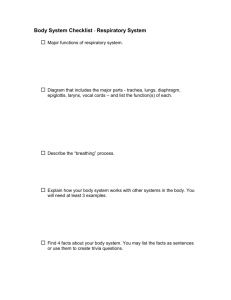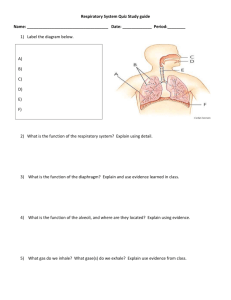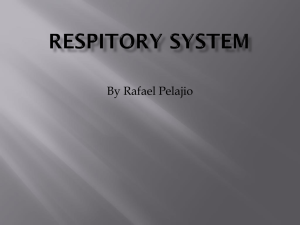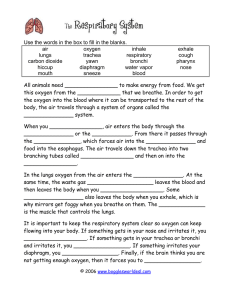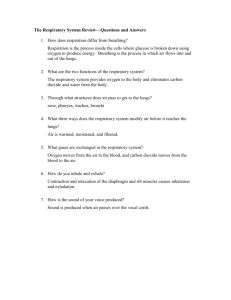Respiratory System Notes and Worksheet
advertisement
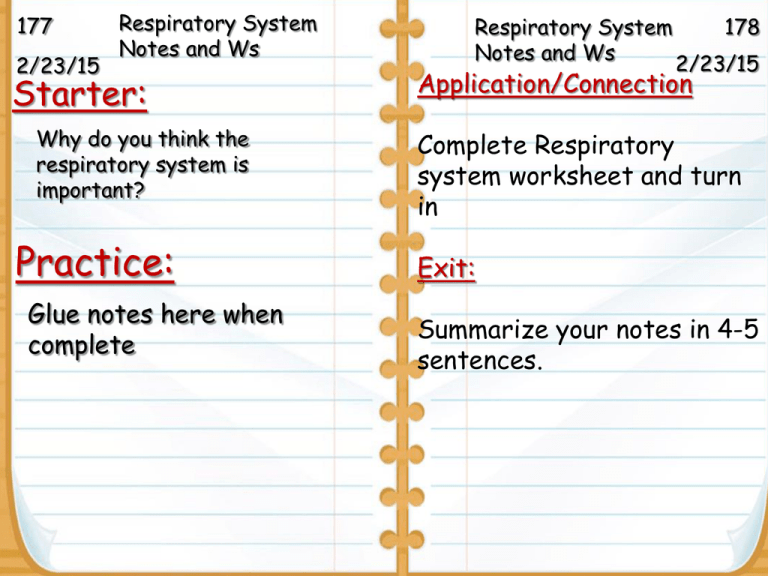
177 2/23/15 Respiratory System Notes and Ws Starter: Why do you think the respiratory system is important? Practice: Glue notes here when complete Respiratory System Notes and Ws 178 2/23/15 Application/Connection Complete Respiratory system worksheet and turn in Exit: Summarize your notes in 4-5 sentences. FEBRUARY 23 2015 AGENDA OBJECTIVE 7.12 B IDENTIFY THE MAIN FUNCTIONS OF THE SYSTEMS OF THE HUMAN ORGANISM, INCLUDING THE, RESPIRATORY, SYSTEM BY COMPLETING NOTES AND A WS 1. Starter 2. Notes’ 3. Ws 4. Exit Table of Contents Date 2/17 2/18 2/19 2/20 2/23 Lecture/ Activity/ Lab Page Digestive System Notes and Ws Exretory System Notes and Ws Digestive System Corp Letter Digestive System Lab Respiratory System Notes and Ws 169-17 171-17 173-174 175-176 177-178 Respiratory System 1.MAJOR ORGANS •Nose •Trachea (windpipe) • Lungs •Diaphragm 2. NOSE • Air enters your body at the nostrils or NASAL CAVITY in your nose. 3. NASAL CAVITY’S FUNCTION • In the nose, air is moistened by the mucus. • It is warmed by contact with the blood. • It is filtered or cleaned by mucus and hairs trapping dust particles. 4. PHARYNX •Another name: The voice box •Passageway force air into the lungs and food into esophagus •Important in vocalization 4. TRACHEA •Another name:The windpipe •Passageway for air to move to and from the respiratory system •Rings of cartilage hold it open 5. BRONCHI AND BRONCHIOLES • The trachea branches into two tubes called Bronchi to carry air into the lungs. • The Bronchi break up into smaller branches called bronchioles. 6. LUNGS •Main organs of the Respiratory System •Where gas exchange occurs 7. ALVEOLI • Tiny sacs that allow for gas exchange. • This is where the respiratory system joins the circulatory system. 8. GAS EXCHANGE •oxygen changes place with carbon dioxide and water. 9. DIAPHRAGM • Large dome-shaped muscle • When the diaphragm moves it causes you to inhale and exhale. • Inhale – breathe in • Exhale – breathe out 10. FUNCTION •Moves oxygen into the body •Removes carbon dioxide, water and wastes 11. RESPIRATION • the process by which oxygen and glucose (sugar) undergo a complex series of chemical reactions inside cells. This is basically how cells use oxygen to make energy from the glucose. The waste product from these reactions is water and carbon dioxide. 12. MAINTAINING HOMEOSTASIS • Cells use the oxygen to make energy to perform their jobs. • If the cells don’t have oxygen they can’t do their jobs so tissues and organs begin to die. 177 2/23/15 Respiratory System Notes and Ws Starter: Why do you think the respiratory system is important? Practice: Glue notes here when complete 178 Respiratory System Notes and Ws 2/23/15 Application/Connection Complete Respiratory system worksheet and turn in Exit: Summarize your notes in 4-5 sentences.
